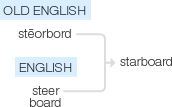Starboard
Old English stēorbord ‘rudder side’ (see steer1, board), because early Teutonic sailing vessels were steered with a paddle over the right side.
wiktionary
From Middle English sterbord, from Old English stēor(“steer”) + bord(“side (of a ship)”), referring to ancient ships with the steering oar set to the right (to accommodate right-handed crew). Ships had to dock on their left (port) side because the steering oar on the right would get in the way, which is how the left became known as the port side.
etymonline
starboard (n.)
Old English steorbord, literally "steer-board, side on which a vessel was steered," from steor "rudder, steering paddle," from Proto-Germanic *steuro "a steering" (compare German Steuer), from PIE *steu-, secondary form of root *sta- "to stand, make or be firm," + bord "ship's side" (see board (n.2)). Similar formation in Old Norse stjornborði, Low German stürbord, Dutch stuurboord, German Steuerbord.
Early Germanic peoples' boats were propelled and steered by a paddle on the right side. The opposite side of the ship sometimes in Germanic was the "back-board" (Old English bæcbord). French tribord (Old French estribord), Italian stribordo "starboard" are Germanic loan-words.
